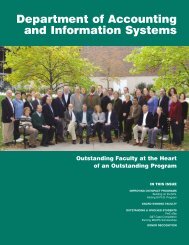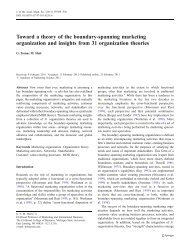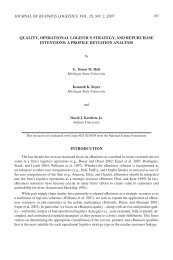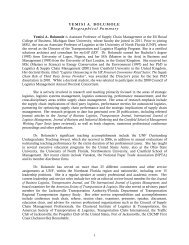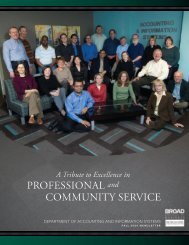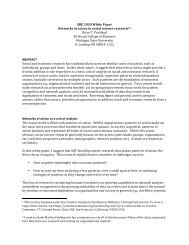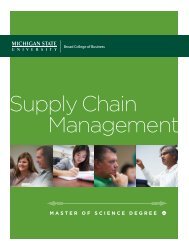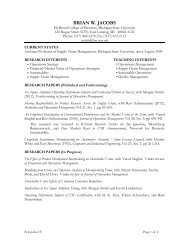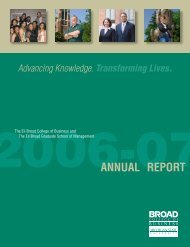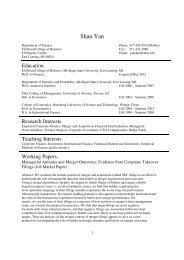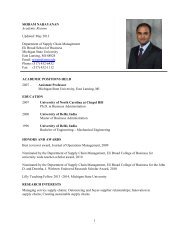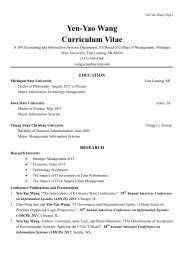In my own words...The first P is passion. You have <strong>to</strong> haveone great passion in your life and mineis tennis. The second P is persistencein giving back <strong>to</strong> the world. So manygreat things have come <strong>to</strong> me in mylife — I feel like I am on the 40th floorand I need <strong>to</strong> send the eleva<strong>to</strong>r down<strong>to</strong> bring others up here. I believe if youhelp just one person, you are truly doingsomething important. The third P ispatience, which is something we all have<strong>to</strong> focus on when things are not goingwell. The fourth P is parents — in all<strong>of</strong> the world, there are only two peoplewho really want you <strong>to</strong> do better in lifethan they did. My parents, my family,my sister, Tania Kaur Narula (BA SupplyChain Management ’99) are everything<strong>to</strong> me.My four Ps are surrounded by a pod,something that is very important <strong>to</strong> me:prayer. I am a Sikh and my religion isabout discipline, working hard, workinghonestly and remembering His name.It’s okay with me that not everyonehas the same beliefs, not everyone has areligion. But I think we all need faith insomething larger than ourselves <strong>to</strong> keepus going.Gratitude for good fortuneWhen I received the DistinguishedYoung <strong>Alumni</strong> Award from <strong>Michigan</strong><strong>State</strong>, I was humbled and honored. Ihave been so lucky: I am 29 years oldand I am an executive in the financialservices practice at Accenture, one <strong>of</strong>the world’s largest management andconsulting firms. I have worked withthe <strong>to</strong>p leaders in the <strong>to</strong>p companies inthe world including SunTrust Banks,Ford Mo<strong>to</strong>r Company, Siemens, TheTravelers Companies, Steelcase and TheDow Chemical Company.After spending three months helpingothers after the 2004 Indian Oceantsunami disaster, then working for sixweeks after Hurricane Katrina as arescue team leader and volunteeringin many other capacities in the United<strong>State</strong>s and in other countries, I see howmuch I still need <strong>to</strong> give.I have been so lucky. From the <strong>Broad</strong>School and <strong>Michigan</strong> <strong>State</strong>, I found outit’s okay <strong>to</strong> stand out: that’s how youbecome outstanding.Navneet SinghNarula(BA Marketing ’00)Executive-Financial ServicesAccenture InternalLawrenceville, Ga.Navneet Narula received the DistinguishedYoung <strong>Alumni</strong> Award from the <strong>Michigan</strong> <strong>State</strong>University <strong>Alumni</strong> Association in Oc<strong>to</strong>ber 2007.The award is given annually <strong>to</strong> individuals whohave distinguished themselves by obtaining ahigh level <strong>of</strong> pr<strong>of</strong>essional accomplishment andwho possess high standards <strong>of</strong> integrity andcharacter <strong>to</strong> positively reflect and enhance theprestige <strong>of</strong> MSU. These individuals demonstratea commitment <strong>to</strong> the university by continuingoutstanding volunteer service on behalf <strong>of</strong> theuniversity and/or participation and leadershipin meri<strong>to</strong>rious public service on a local, state,national or international level.Narula became personally involved in the 2004Tsunami Relief Operations in South India andNicobar Islands, living in relief camps for threemonths and working with the survivors as ateam leader <strong>of</strong> an NGO, <strong>leading</strong> 45 medical andother volunteers. He managed the South Indiaand Andaman/Nicobar Island operation, buildingnew homes, preparing food for survivors,distributing supplies and providing medicalaid. He ultimately committed <strong>to</strong> provide twoorphaned children with lifelong education.In 2005, he spent six weeks in New Orleansassisting in the relief efforts following HurricaneKatrina. As a rescue team leader, he helped openmultiple relief shelters for survivors, procuringdesperately needed clothes, food suppliesand medical aid. Later that fall, he turned hisenergies <strong>to</strong> help those suffering in the aftermath<strong>of</strong> the Southeast Asia earthquake. As part <strong>of</strong>his long-term vision for the rehabilitation <strong>of</strong> thearea, he pioneered the first computer institute inPoonch, Kashmir.As a result <strong>of</strong> his many humanitarian projectsand his involvement in numerous charitable andcommunity-building initiatives (including manyin his adopted home city <strong>of</strong> Atlanta), he wasrecently recognized by Sena<strong>to</strong>r Hilary Clin<strong>to</strong>nas among the “Outstanding 50 Asian Americansin <strong>Business</strong>.” He is a direc<strong>to</strong>r <strong>of</strong> United Sikhs,an international non-pr<strong>of</strong>it, non-governmental,humanitarian relief, human development andadvocacy organization, aimed at empoweringthose in need, especially disadvantaged andminority communities across the world.12BROADBUSINESSwww.bus.msu.edu
Research <strong>to</strong> RealityIlies finds high workloadsharm family lifeRemus Ilies received his doc<strong>to</strong>rate from theUniversity <strong>of</strong> Florida. His research, whichinvestigates the influence <strong>of</strong> dispositionsand affect on broad organizational outcomessuch as leadership, motivation and jobattitudes, has been published in scholarlyjournals such as Academy <strong>of</strong> ManagementJournal, Journal <strong>of</strong> Applied Psychology,Journal <strong>of</strong> Organizational Behavior,Leadership Quarterly, OrganizationalBehavior and Human Decision Processes,Personnel Psychology, and PsychologicalBulletin. He serves on the edi<strong>to</strong>rial boards<strong>of</strong> Journal <strong>of</strong> Applied Psychology, Journal<strong>of</strong> Organizational Behavior and LeadershipQuarterly.Here’s an all <strong>to</strong>o familiar scenari<strong>of</strong>or most working adults: It’s been a<strong>to</strong>ugh day at work, and you’re lookingforward <strong>to</strong> a quiet evening at home.But something keeps nagging you, andwhen you get home <strong>to</strong> your family, evenafter working a regular 8-5 workday,you’re still not in a very good mood.Well, there may be a reason...Recent research conducted by a team<strong>of</strong> researchers led by Remus Ilies, theGary Valade Research Fellow at the<strong>Broad</strong> School, showed heavy workloadsinterfere with quality family time,irrespective <strong>of</strong> the amount <strong>of</strong> timeactually spent at work during the day.In an article published in the Septemberissue <strong>of</strong> the Journal <strong>of</strong> AppliedPsychology, “When Can EmployeesHave a Family Life? The Effects <strong>of</strong>Daily Workload and Affect on Work-Family Conflict and Social Behaviorsat Home,” Ilies and co-authors reportthe results <strong>of</strong> a study conducted overtwo weeks during which employeesreported, on a daily basis, theirworkloads, feelings and work-familyconflict.The results showed employees’ dailyworkloads (e.g., <strong>to</strong>o much work <strong>to</strong> do,high time pressure) influenced howthey felt at work and at home: Ondays when they had high workloads,employees experienced increased workfamilyconflict (when work interfereswith their family life), irrespective <strong>of</strong>the amount <strong>of</strong> time spent at work.In addition, the feelings experiencedby employees at home and their level<strong>of</strong> work-family conflict influencedemployees’ participation in familyactivities at home. That is, Ilies andco-authors found that the employees’spouses reported that their partnersengaged in fewer social activities(outings with family members, such asvisiting a park or attending a footballgame, visiting relatives or friends withtheir spouse, eating dinner with thefamily, etc.) on days when they reportedincreased work-<strong>to</strong>-family conflict andless positive feelings.13BROADBUSINESSwww.bus.msu.edu



